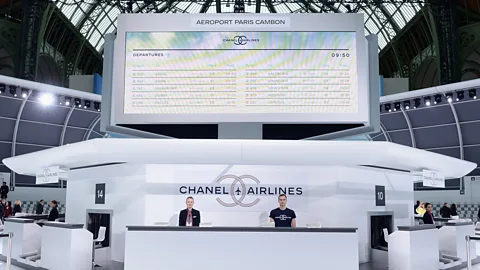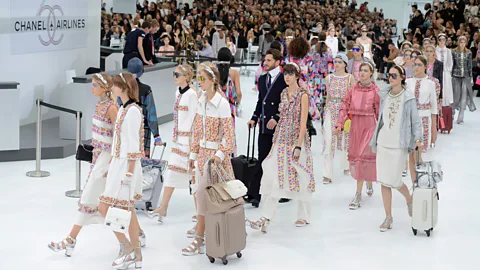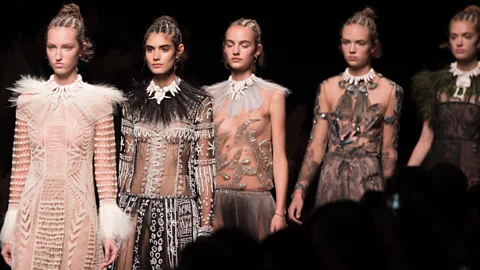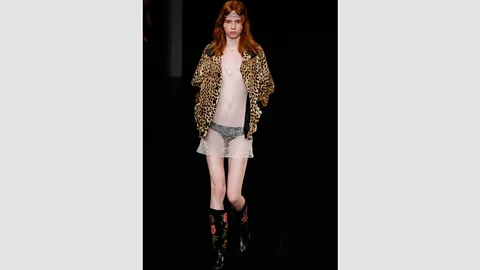Paris Fashion Week: Flying high
 Getty Images
Getty ImagesAs the French capital’s week comes to a close, Susie Lau takes a trip with Chanel, enters a virtual reality with Louis Vuitton and gets rebellious with Saint Laurent and Miu Miu.
Over the last few days, it felt like we were hurtling towards a new aesthetic stratosphere, as the fashion crowd flew over continents and beyond. That’s the power of the largest fashion houses as they bring Paris Fashion Week to a close. Sometimes the results are fantastical and positively uplifting. Sometimes, they make us question the state of the industry and confront its demons.
Come fly with me
Welcome aboard Chanel Airlines. Its destination? Jet-set cities where economies are booming, like Dubai, Seoul and Singapore. And what do these frequent flyers wear? The most ostentatious and well-put-together airport attire you’ve ever seen, including takes on the classic tweed suit that looked like air hostess uniforms, kitschy departure board prints, iridescent fabrics that shimmer and gleam, and truly luxurious denim. Chanel wheelie cases got the crowd going as yet another lucrative product category was added to its double C-branded universe. Karl Lagerfeld once again played on a gamut of ideas brought together by a focus on the high-flying customer. The very idea of a Chanel branded luggage trolley was enough to make the crowd giddy.
 Getty Images
Getty ImagesAt Louis Vuitton, there was a very different form of travel on display. Nicolas Ghesquière took us into a virtual reality, riffing on games like Minecraft and films such as Tron, 2046 and the animé Neon Genesis Evangelion, which shaped our idea of a ‘cyber’ character. She wore a mix of boxy spliced leather jackets, gel-filled embroidered silks, spacy sequins bubbled up into dresses along with bubble-skirted smocks and leather waistcoats that felt straight out of the rebooted Mad Max. It was a cacophony, but one that made sense in the context of Ghesquière’s penchant for forward-thinking. Louis Vuitton is a house based on travel and in Ghesquiere’s very capable hands, the destination is a metaphysical future.
Controversy rears its head
Cultural appropriation is as always a touchy subject in fashion; often brushed under the carpet due to the assumption that designers mine global cultures (either with or without tact) in the name of artistry. It becomes harder and harder to avoid the theme when online commentary is at its most rampant. Valentino’s Pierpaolo Piccioli and Maria Grazia Chiuri came under fire this week from the Twittersphere for sending out a collection inspired by “wild, tribal Africa” on a mostly white cast of models with cornrows in their hair.
 Getty Images
Getty ImagesThe clothes were undeniably beautiful, as they always are. And yet there was unease about the collection, which presented Africa as one catch-all continent, with the sort of stylistic tropes that felt like tired stereotypes. Chiuri and Piccioli had noble intentions – they attempted to channel their thoughts on mass immigration into their collection – but perhaps they could have been expressed them with more sensitivity, giving some context to their otherwise elegant creations.
Rebel rebels
It’s interesting to note that fashion houses and their collections continue to skew younger and younger and their older clientele willingly clamour for this elixir of youth. Hedi Slimane’s vision at Saint Laurent is still that of a rebellious teenager, stomping her thin-limbed body down the runway in hell-raising oversized outerwear and the skimpiest and shiniest of slip dresses, with festival-appropriate Wellingtons and a deliberately plastic-looking tiara on her head. The collection evoked Corinne Day’s famous photograph of a young Kate Moss, an image that has proven to have enduring influence. It’s why Saint Laurent flies off the shelves. Those sparkly wellies? Glastonbury awaits.
 Getty Images
Getty ImagesAs the final note to Paris, Prada’s younger and more playful sister Miu Miu always bends towards youth. Here though, the distinction felt even more emphasised, as sheer negligees layered over Victoriana shirts worn with zany, metallic glam-rock platform boots felt like an ode to Harajuku Lolitas. Fashion’s fetishisation of the ‘kawaii’ (cute) went into overdrive here. And it felt right on the money.